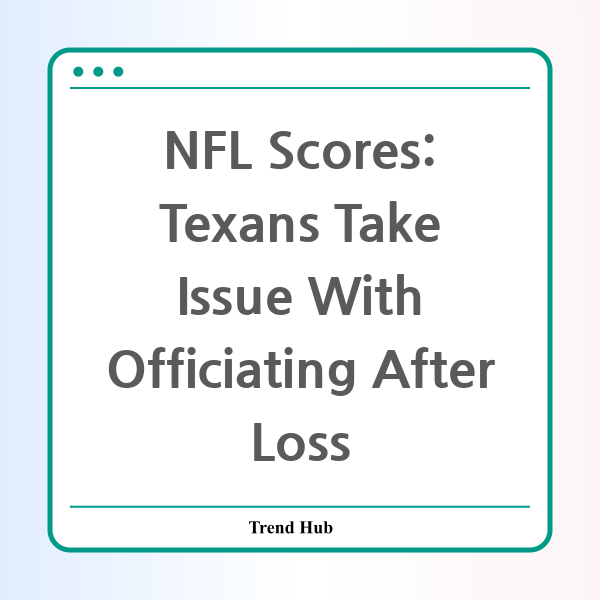* This website participates in the Amazon Affiliate Program and earns from qualifying purchases.

The NFL playoffs are a stage where every play, call, and second counts. In the latest divisional round, the Houston Texans faced off against the Kansas City Chiefs, only to find themselves embroiled in a controversy that has left many fans buzzing. The focus has shifted from the scores to the officiating, with Texans players voicing strong discontent regarding how the game was called.
Following the 23-14 loss to the Chiefs, Texans defensive end, Will Anderson, made headlines by declaring that it felt like it was "Texans versus the refs." This sentiment encapsulates the frustrations of a team that had high hopes entering the playoffs but ended up on the wrong side of pivotal officiating decisions. The Texans faced two particularly controversial penalties that extended crucial drives for Kansas City, transforming what could have been defensive stands into scoring opportunities.
In a crucial moment during the game, Anderson was penalized for roughing the passer after a light touch on Chiefs quarterback Patrick Mahomes, which allowed Kansas City to convert a drive into a field goal. This was not an isolated incident; another penalty arose when Texans players collided with Mahomes after he had begun to slide, leading to yet another 15-yard penalty and a subsequent touchdown. These calls have stirred debate across social media, with fans and commentators alike questioning whether Mahomes receives preferential treatment from officials.
Head Coach DeMeco Ryans recognized the challenge of facing the Chiefs, stating that the team needed to perform at its best, regardless of the circumstances. He emphasized the importance of overcoming mistakes, particularly in playoff football. Despite the Texans outgaining the Chiefs by over 100 yards—a first in postseason history for a losing team—the lack of conversion on opportunities and inability to capitalize on yardage ultimately cost them the game.
The Texans' struggles were not singularly tied to the officiating. Quarterback C.J. Stroud faced intense pressure throughout the match, resulting in eight sacks. His performance highlighted the need for improved offensive protection moving forward. While Stroud did manage to rush for 42 yards, it was evident that more cohesion and support from the offensive line will be essential for future success.
Special teams also played a role in the Texans' downfall. Missed kicks, including an extra point and a blocked field goal attempt, compounded their difficulties. The team’s lack of execution in critical moments—such as allowing a 63-yard kickoff return that set the Chiefs up well—showcased areas needing improvement in the offseason.
As the Texans reflect on their exit from the playoffs, the narrative surrounding officiating may overshadow their performance. Ryans and his players have voiced their frustration, expressing a need to learn from their mistakes while also acknowledging that they cannot rely on the officials to dictate the outcome of their games. "You can never leave it into the refs' hands. It is what it is," remarked a frustrated running back in the locker room after the game. This postseason serves as a reminder that in the world of NFL scores, officiating can profoundly influence the game, igniting discussions among fans and players alike.
In conclusion, as we analyze the implications of this divisional round defeat, it’s clear that the Texans must focus on internal growth and resilience. Overcoming both external challenges, such as officiating, and internal flaws will be pivotal in their pursuit of a successful next season. In the unpredictable atmosphere of playoff football, every detail matters—on and off the field.
* This website participates in the Amazon Affiliate Program and earns from qualifying purchases.